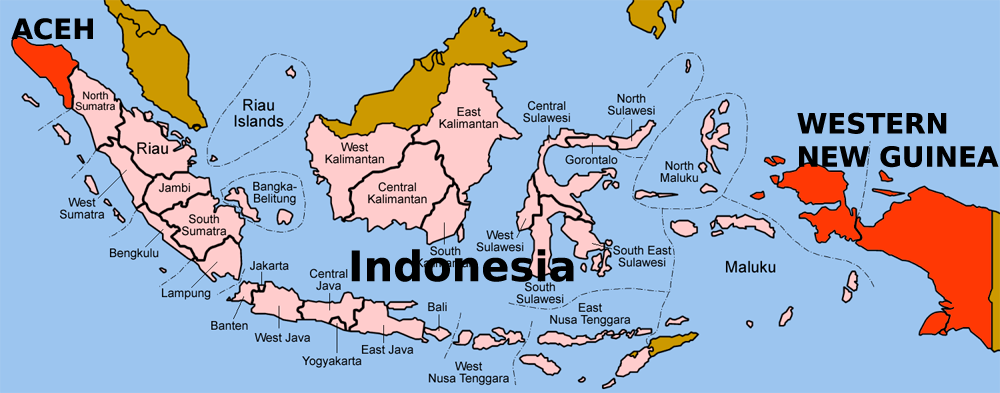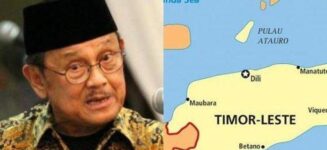Originally published in The Jakarta Post on Oct. 10, 2003. Also published in https://jawawa.id/index.php/newsitem/jakartas-neurosis-over-aceh-and-papua-why-1447893297
The public hearing on Aceh and Papua held by the European Parliament in Brussels on Oct. 1 was a rare but important occasion. It also showed support for Indonesia. But Jakarta declined the invitation, leaving the international community out in the cold.
The time has passed that governments — thanks to decades of Cold War — can hide human rights abuses, confine them as “domestic issues” and evade responsibility for human disasters, as in Cambodia, Indonesia and East Timor in the 1960s and 1970s.
Today the issues may be seem less tragic, but the changing context has charged the global trends of public opinion with a different intensity. As Europe, unlike the United States, is less preoccupied with the “war on terror” in Asia, European institutions are encouraging peace and dialog on issues less important for global security, yet quite urgent in terms of the human rights of local peoples. The war in Aceh and the case of violence-ridden Papua are such issues.
Following its resolution last June, the European Parliament (EP)’s hearing was intended as an exchange of views on human rights issues involving all sides. The four speakers invited included Malik Mahmud of the Free Aceh Movement (GAM) and two human rights activists — Aguswandi of Kontras in Aceh and John Rumbiak of the Institute for Human Rights Studies and Advocacy (Elsham) — only Jakarta’s representative was absent.
The committee chairman Max van den Berg (of the Labor party in the Netherlands) stressed, “we respect the Indonesian state in its full integrity and sovereignty, we do not support the rebels, but we do want to listen to other opinions.” Didier-Rod (France, Green-Left) who led the forum, expressed the same view and regretted Jakarta’s refusal to join the discussion.
As Indonesia’s new envoy to the EU, Abdurrachman Mattaliti, only arrived in Brussels shortly before the hearing and had yet to present his credentials, he declined to comment on the hearing. In Jakarta’s view, the EP had put Indonesia and GAM as “equals” as the GAM representative was referred to as “the Prime Minister of Aceh-Sumatra National Liberation Front.”
So “we made a strong objection,” the envoy explained. “We acted as instructed by Jakarta,” Counselor Agus Sarjana said.
However, the hearing did not turn into a campaign to undermine RI’s position as Jakarta clearly feared. The Indonesian military and GAM were seen as parties to the violence, but no one questioned the territorial integrity of Indonesia. One member, N. Deva (U.K., Conservative), even warned against “renewed imperialism” which, he said, might occur as in Sri Lanka if the West started to “intervene in the affairs of other countries”.
GAM’s Malik Mahmud requested an immediate reopening of the dialog “with a neutral government to act as mediator.”
EP members thus called for efforts to focus on humanitarian and human rights issues i.e. on the urgency to help war victims, restore civil rights in Aceh and support efforts to build peace zones in Papua. Aguswandi pleaded: “All of us, Indonesians and Acehnese, will be the losers (of the war in Aceh).” (Since) the struggle of the civil society “is not about having our own state, nor about territory, but about people, Acehnese and Indonesians, the international community should support the civil society’s role in building peace in Aceh”.
Given the severe restrictions for the media and aid agencies, several EP members proposed a mission to investigate human rights violations and to gain direct access to war victims. “We want an international fact-finding mission to be sent,” said GAM’s Malik Mahmud. But since humanitarian aid presupposes a civilian rule, the critical issue was the martial law in Aceh. Moderator Didier- Rod concluded: “We cannot support military rule, only dialog can restore a civilian rule”.
Thus Europe may be poised to convey the message that if the situation in Aceh and Papua continues to worsen, a fruitful Europe-Jakarta dialog may be constrained by the issue of restoring the rule of law.
But, as Rumbiak pointedly criticized the West and Jakarta, one key issue remains: “How could the international community encourage Indonesia to nurture a democracy when they maintain a military link that threatens to destroy Indonesia’s new democracy and respect for human rights? Both were trapped into the global campaign on terror which defines security as state security rather than human security,” Rumbiak said.
These are important global and humanitarian issues, which Jakarta should be ready to respond to, instead of avoiding them.
Haven’t Indonesian diplomats in the past always spoken out on East Timor whenever the resistance campaigned abroad, including at the European Parliament? At the Brussels Hilton in early 1992 then foreign minister Ali Alatas aggressively and eloquently confronted the international press shortly after the St. Cruz massacre — in which hundreds of protesters were killed — had shocked the world. The best defense is offensive.
He succeeded to convince the media that Jakarta neither directed nor condoned the killings and impressed them by offering a different perspective — thus, defusing the uproar on Vice President Try Sutrisno’s “dirty lie” that “only 19 were killed”.
With full support for Indonesia’s integrity, Jakarta is now much stronger than previously, as an aggressor, dealing with the East Timor issue. So why now the neurosis against the world?
Jakarta’s attitude has been unusually nervous and suspicious in its attempts to keep “external” elements out of Aceh. This has run through incidents from the shootings of German tourists; to the threatening and deporting of American, South Korean, Malaysian and Japanese journalists; the restriction and harassment of local journalists and activists, to effectively ban all foreign press and aid agencies and the hunting down of Acehnese outside Aceh — all at the price of the greater suffering and isolation of local Acehnese.
Even two Australian seafarers stranded in Aceh were suspected of “foreign conspiracy”. In Papua, the paranoia grew since the killings of American teachers last year provoked a series of FBI investigations and Papuans resisted the division of the province.
All of these seem to reflect doubts among political and military leaders about what really happened, as Jakarta is determined to prevent the issues of Aceh and Papua from going international. The crux of the matter is, to quote one EP member, “We respect Indonesia’s border, but why did they do all that (abuses) to maintain the border?”
It is this pregnant question that must be addressed. With soldiers and armed rebels operating virtually “uncontrolled” in vast areas “protected” by the martial law, the fear of abuses will not go away easily.
Jakarta has “lost” East Timor not because, but in spite of, its diplomacy. If any lesson should be learned, it is that abusive realities on the ground, not international forums abroad, might provoke the world to internationalize the conflicts.



